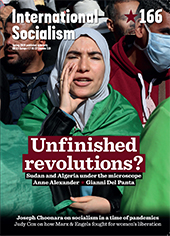Every time there are successful mass uprisings, the working-class sets up its own ways of organising its society. In Russia in 1917 these were called Soviets or committees, in Sudan, in 2019 and since, they are called Resistance Committees. Below we include a description of these Committees taken from the book, The Song of Revolt, by an icon of that uprising, Alaa Salah, a young Sudanese woman.
The Sudanese resistance committees (lijna al-mugaawima لجنة المقاومة) are informal, grassroots neighbourhood networks that started organising civil disobedience campaigns against the former government from 2013.
Activated almost exclusively by the youth, the local resistance committees constituted an essential element in the Sudanese 2019 uprising. These citizen collectives were self-organised and established across the country.
They participated in the organisation of the mass demonstrations until the fall of the former president, Omar Bashir. They then helped to organise the sit-in that was held in central Khartoum, the capital. Today, they remain clearly participating in the democratic transition in support of a civilian government. But they are limited by meagre budgets and administrative support that is largely in the hands of supporters of the former regime.
After the fall of the former president, the resistance committees operated openly. The constitutional document for the transition period has legitimised their presence and their role. They are recognised organs that possess an administrative structure.
Resistance committees are established in every local area and their members can take action without the fear of reprisals from the police or other security forces. Their principal mission is to sensitise the whole population on the challenges of the civilian transition in a way that involves everyone. They ensure the citizens are informed of political developments, they organise public debates in local areas. Sudanese people of all ages are involved in these activities.
The responsibilities of the resistance committees are enormous and normally concentrate on the state and its officials. But if the state is not able to fully play its role of providing basic services to the population, it is the responsibility of the resistance committees to cooperate with the public sector to support the transition period. Thus although we continue to be confronted with serious shortages the resistance committees organise the provision of basic necessity like gas or bread. Records are kept of all families including the number of members and their needs. In collaboration with the bakers the committees supervisors the management of the stocks of flour.
In my area I have realised that the collection and analysis data is useful for establishing a multitude of services. During the COVID-19 pandemic the committees have been very active especially for undertaking disinfection campaigns in the houses of confirmed cases. On a daily basis I dedicate an important part of my time for work with the committees of my community. We meet at least twice a week and every time I have the impression of experiencing the atmosphere of the sit-in, especially when we sing the songs of the protests together.
For more details on developments in Sudan and the mass protests of 2019, see:






